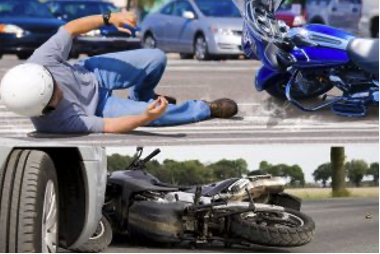
If you ride a motorcycle in Oakland, you must be prepared for the possibility of an accident. Knowing exactly what to do in the immediate moments after a crash can make a significant difference in your recovery and your ability to receive fair compensation.
Motorcycle accidents are inherently more dangerous than car accidents because motorcyclists lack the enclosed protection of a vehicle. Without airbags, seat belts, or a protective frame, riders are at an increased risk of serious injuries or even fatalities.
While California law requires all motorcyclists to wear helmets (VEH § 27803), accidents still result in severe consequences due to the lack of overall protection. If you or someone you love has been injured in a motorcycle accident in Oakland, taking the right steps immediately after the crash can help you protect your health and your legal rights.
And, of course, hiring an Oakland motorcycle accident lawyer is one of the steps you can’t afford to skimp out on for your own benefit.
If you get into a motorcycle accident, the first few moments afterward are critical. Your injuries, the way you handle the situation, and how quickly you act can impact your recovery and the compensation you receive. Here’s what you need to do:
The moment your motorcycle crashes, your adrenaline will spike. You might feel like you can get up and walk away, but that doesn’t mean you’re not injured. Take a deep breath and check yourself to see if you’re bleeding, feel pain, or if you can move all your limbs.
Some injuries, like internal bleeding or concussions, might not show symptoms right away, so don’t assume you’re fine just because you don’t see blood.
Even if you feel okay, call 911. This serves two major purposes: first, it gets medical professionals on the scene who can properly assess your injuries. Second, it ensures that a police report is filed, which is crucial for insurance claims and any potential legal action.
Some drivers might try to convince you not to involve the police; don’t listen to them at all. A police report is one of the strongest pieces of evidence you’ll have if you need to file a claim later.
When paramedics arrive, let them examine you. If they recommend going to the hospital, don’t argue with them; just go. Even if you think you’re fine, injuries like traumatic brain injuries (TBI) or internal organ damage can worsen over time.
If you refuse medical treatment at the scene, insurance companies might later argue that your injuries weren’t serious, which can affect your claim.
If you’re physically able to, start documenting everything. Use your phone to take pictures and videos of:
Your motorcycle and any visible damage
The other vehicle(s) involved, including license plates
The surrounding road conditions (potholes, debris, skid marks, etc.)
Any visible injuries on your body
Also, get the contact information of any witnesses. Their testimony could make a huge difference if there’s a dispute about what happened.
You’ll need to get the following details from the driver involved in the accident:
Full name
Contact information
Insurance company and policy number
Driver’s license number
License plate number
Make, model, and year of their vehicle
Once you leave the accident scene, you’ll likely receive calls from insurance companies asking for a statement. It’s important to remember that insurers just want to pay as little as possible. Here’s what you should do:
Do not admit fault in any way or form.
Do not agree to be recorded. Many insurance adjusters record calls, and anything you say can be used to downplay your claim.
Consult a lawyer before accepting any settlement. Initial settlement offers are often lower than what you may be entitled to. A lawyer can negotiate a fairer payout for all of your medical expenses and even lost wages and other damages.
Beautiful roads and scenic rides can also pose unique risks for motorcyclists. If you find yourself injured in a motorcycle accident, knowing the right steps to take—and consulting an experienced motorcycle accident lawyer—can help you recover physically, emotionally, and financially. Use the steps in this article as a guide for navigating the aftermath of being an accident victim.